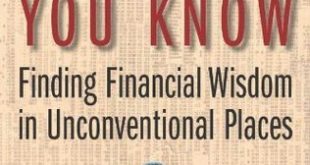‘Har du modet att lyssna’ [embedded content] Poesi och musik i vacker förening. Hansson de Wolfe United — ett fenomen i svensk popmusik utan motstycke.
Read More »Identity politics is bullshit
Identity politics is bullshit Identität ist alles. Ich. Meine Werte und meine Rechte. Das, was (zu) mir gehört. Was ich bin oder sein will. Wovon ich überzeugt bin, weil ich es einfach weiß. Wofür ich anerkannt und entschädigt werden muss. Identität ist eine riesige Sprechblase, die immer größer wird, je mehr Leute sich am Spiel beteiligen: Identität ist Heimat ist Hautfarbe ist Geschlecht ist sexuelle Orientierung ist Kultur ist Herkunft ist Familie ist...
Read More »Facebook’s role in Brexit
Facebook’s role in Brexit [embedded content]
Read More »The Great Hack
[embedded content] Just watch it!
Read More »Everything you want to now about MMT
Everything you want to now about MMT [embedded content] One of the positive contributions of MMT, especially from a european point of view, is that it makes it transparently clear why the euro-experiment has been such a monumental disaster. The neoliberal dream of having over-national currencies just doesn’t fit well with reality. When an economy is in a crisis, it must be possible for the state to manage and spend its own money to stabilize the economy....
Read More »Warum das deutsche Schulsystem so schlecht ist
Warum das deutsche Schulsystem so schlecht ist [embedded content]
Read More »Solow kicking Lucas and Sargent in the pants
Solow kicking Lucas and Sargent in the pants Professors Lucas and Sargent … have a proposal for constructive research that I find hard to talk about sympathetically. They call it equilibrium business cycle theory, and they say very firmly that it is based on two terribly important postulates — optimizing behavior and perpetual market clearing. When you read closely, they seem to regard the postulate of optimizing behavior as self-evident and the postulate...
Read More »Bachman-Turner Overdrive
[embedded content]
Read More »Chants Magnetiques
[embedded content] An absolute classic. My favourite Autobahn music.
Read More »Non-normal normality
Asset price distributions are of great practical significance for portfolio managers. Standard finance theory assumes that asset price changes follow a normal distribution—the well-known bell curve. That this assumption is roughly accurate most of the time allows analysts to use very robust probability statistics. For example, for a sample that follows a normal distribution, you can identify the population average and characterize the likelihood of variance from that average....
Read More » Lars P. Syll
Lars P. Syll




